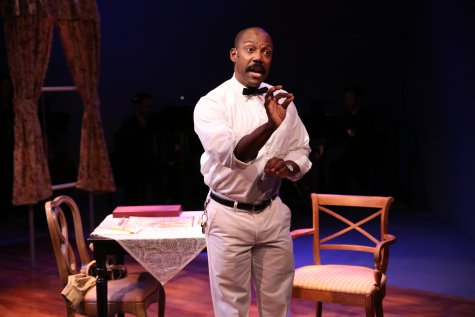Inner Voices
Three fascinating musical monologues, in turn, sweetly bizarre, heartwarming and shattering.

T. Oliver Reid in a scene from “Just One ‘Q,’ ” part of Premieres’ “Inner Voices” (Photo credit: Carol Rosegg)
[avatar user=”Joel Benjamin” size=”96″ align=”left” ] Joel Benjamin, Critic[/avatar]Paulette Haupt, producing artistic director of Premieres, should be very proud of herself. Her “Inner Voices” program at the TBG Theatre managed to shock, move and entertain. The three short one-act musical monologues, each with a distinctive voice and each performed by an expert singer/actor were sweetly bizarre (Just One “Q”), shattering (The Pen) and heartwarming (The Booty Call).
Just One “Q”, written by Ellen Fitzhugh (words) and Ted Shen (music) is a Eudora Welty-esque tale narrated in song by the extraordinary T. Oliver Reid as Benny, an orderly in small town nursing home. He also plays Bertha, a worn-out mother of eleven, who has been dropped there by her offspring, placing her in direct contact with Julynne, the woman who ran off with her husband Green. Over a spiteful game of Scrabble the two women, deftly guided by Benny, spill their guts. Julynne spitefully pockets the sole Q tile to spite Bertha and disable the game.
The back and forth between the two old biddies reveal their hard luck lives, their revelations flowing quickly and bitterly. The two, refereed by Benny, never achieve a détente, but Bertha’s departure to live with her daughter causes them to reach an uneasy understanding.
Q’s music has a homespun feel, something like the output of Elmer Bernstein, but with enough spiky detours into modern harmony to anchor it in 2016. The story takes place in the sixties, but its tale of lifelong jealousies scarring lives is ageless.
Brad Rouse directed with a feel for the rhythm and cadence of Southern speech. Mr. Reid slyly shifted from one character to the next changing tone and physicality. The expert band consisted of Andrew Resnick (music director/piano), Mary Ann McSweeney (bass), and Harry Hassell (reeds).

Michael Thurber in a scene from “The Booty Call,” part of Premieres’ “Inner Voices” (Photo credit: Carol Rosegg)
The Booty Call, by Saheem Ali (words) and Michael Thurber (music), tells the charming tale of a man, Gabe, played by Mr. Thurber, who is working on a demo recording in his home/studio while pondering the ups and downs—literally—of his love life. Electronic devices layer rhythm on rhythm and melody on melody while he speaks and sings about his love life. He’s a good guy—good-looking, sweet and earnest—and Mr. Thurber makes Gabe loveable and watchable as he grapples with phone calls, constructing songs and thinking about his life, finally coming to the conclusion that he is at a point in his life where he wants to consider commitment rather than one night stands.
The score, played entirely by Mr. Thurber, flows organically, using Gabe’s thoughts and memories as cues. There are elements of folk music, rock songs, propulsive Latin and even a touch of rap. Whatever form they take they are expressions of Gabe’s frustration.
Mr. Ali’s direction of Booty Call gives it an air of informality that keeps the audience rooting for Gabe.

Nancy Anderson in a scene from “The Pen,” part of Premieres’ “Inner Voices” (Photo credit: Carol Rosegg)
The most impressive work among three fine musical theater pieces was The Pen by Dan Collins (words) and Julianne Wick Davis (music), a work that has much in common with the Poulenc/Cocteau masterpiece, La Voix Humaine, another tale of a distraught woman falling apart. The Pen is a look into the devastation of Obsessive-Compulsive Disorder.
Laura (a truly extraordinary Nancy Anderson) attempts to leave her very ordinary apartment for her commute to work. As Laura goes through her regular departure rituals of stove checking, sink checking and clothing checking, she finally gets around to her handbag. There she finds a mysterious purple pen which is the beginning of her unraveling.
How did it get there? Who handled it? The thought of germs throws her into a frenzy of cleaning, her thoughts spilling over themselves as she desperately races about detoxifying her kitchen. She contemplates her self-imprisonment and the sad events in her life that led her there, including her relationship with her deceased father, which includes her guilt at not being able to make herself visit him while he was on his deathbed. By the end of The Pen your heart breaks for Laura.
Davis’ music, highlighted by the jittery guitar playing of Tom Monkell and Dan Erben, with music direction by Alexander Rovang, is chilling and jarring, full of screechy, scratchy notes and edgy rhythms which Ms. Anderson uses to turn herself inside out emotionally, her helplessness made palpable, certainly helped by the direction of Margot Bordelon. This is simply great musical theater.
The sets and props by Reid Thompson helped inform where each mono-opera takes place and the costumes by M. Meriwether Snipes were character perfect. Oliver Watson’s lighting made the most of the small space.
Inner Voices (October 3-29, 2016)
TBG Theatre, 312 West 36th Street, in Manhattan
For tickets, call 866-811-4111 (OvationTix) or visit http://www.premierenyc.org
Running time: two hours including one intermission






Leave a comment